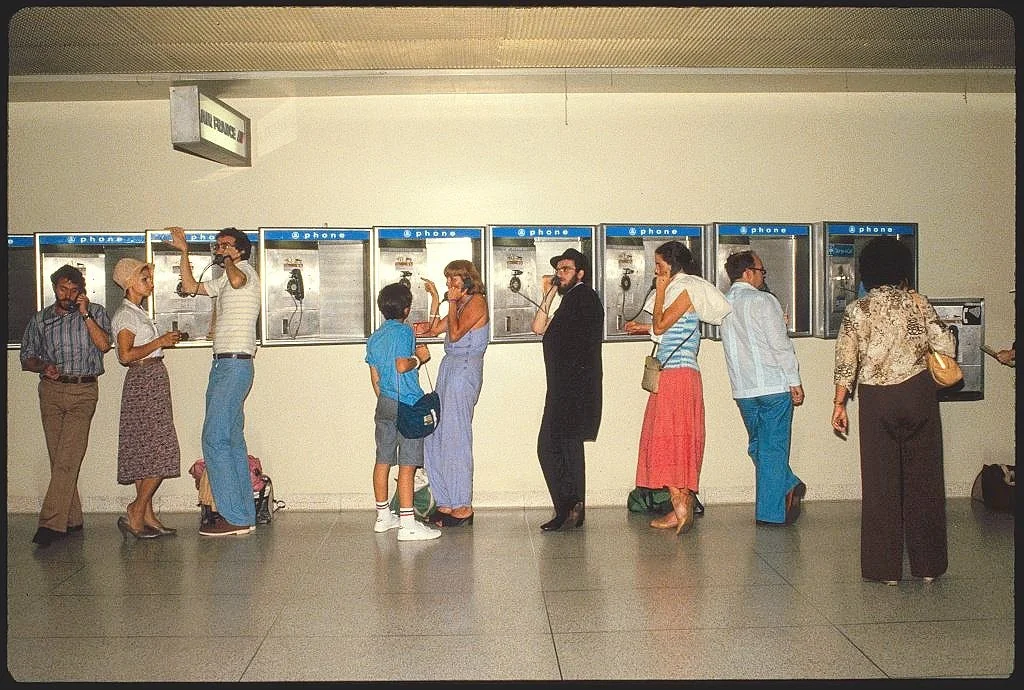Friendly terms
It was harder to solve certain problems in the days before smartphones. But certain other problems didn’t exist. (Bernard Gotfryd, 1981)
My phone said, “Potential Spam,” but curiosity got the better of me. How did it know?
I answered, and sure enough, it was a guy trying to sell me on a “free vacation” which is code for “forced four-hour in-person time-share pitch.”
He was in the middle of dismissing my first objection when my husband called.
“Sorry,” I said. “It’s not a good time. My husband is calling me.” And then I clicked over to the other call.
I felt a little bad, like it was a lie and I was just trying to get out of the call. But there was no better way to handle the situation, and I had no reason to feel bad. I owed the guy on the other end of the line nothing.
In fact, I wonder why I even felt the need to say “sorry.” I say it reflexively, often, even when I have nothing to be sorry for. It helpfully greases the wheels of social interaction. If someone stops me on the street and asks for help finding their destination, I’ll feel genuinely sorry if I can’t help them, and I’ll say so.
However, I’ve been thinking a lot about situations like the one with the telemarketer in which someone else ought to be the one saying sorry — they’re overstepping. They’re inconveniencing me. Maybe they’re being downright rude or presumptuous, and maybe it’s even on purpose. And I’ve begun to notice how often I step up to smooth over these uncomfortable interactions.
A few months ago, I got a message from a neighbor who wanted permission to remove paint off of the side of my garage. I said it wasn’t a priority, and thank you for understanding (all those extra words to make saying no more gentle).
This neighbor didn’t want to take no for an answer, threatening to report me to authorities and taking me to task for not being neighborly — as if it’s neighborly to threaten to report your neighbor to authorities. As if it’s neighborly to try to force someone to engage you in conversation about the changes you’d like to make to their property and try to make them feel guilty for not doing so on your terms.
It was interesting to watch this neighbor use language that you might use to confront someone who is causing a problem on your own property, like, “I’ve spoken to you before about your guests parking on my lawn and throwing beer bottles in my yard.” But this wasn’t that. And I struggled to find the language to push back appropriately and keep things on friendly terms. They already weren’t on friendly terms.
Same thing with the telemarketer. Same thing with the entitled, “It can’t hurt to ask,” messages that so many of us are bombarded by. I don’t want to say, “No, I’m sorry I can’t be more help. Thanks for understanding.” Like the spam calls, I just want to ignore those messages. I don’t want to expend any emotional labor on them whatsoever. I don’t want to put the work into making the other person feel comfortable. I don’t necessarily want to make them feel comfortable.
I’ve gotten very good at saying no over the years, and saying it nicely (or even kindly). I’ve gotten good at sending emails that resolve conflicts and build relationships. I’ve managed to make friends and earn clients through written communication alone. I can generate trust with my words.
And lately, I am really feeling how much work goes into that. I am always willing to do that work for the people who meet me halfway. But not everyone does. For those who don’t — for the ones who try to sell me something or take advantage of my connections before we’ve built a relationship — I’m having a harder time doing the work to say the words that smooth over their faux pas. I want to make sure that I’m taking responsibility for my own words and actions, not theirs. That’s something I’ve struggled with over the years, and I’m really working on it.
You might say that I’m wanting to take care of my side of the street. But that doesn’t mean soliciting ideas for property improvements, literally or figuratively. It means that I will be accountable for what I do and say. It means that I will be kind. And it means that I will uphold my boundaries.
Having learned to use words to prevent or ease misunderstanding, I recognize the importance of being direct when the situation calls for it — or even blunt. Sometimes “no” doesn’t have to be wrapped in gauze and delivered in a gift basket. Sometimes, the kinder thing is to put the energy not into more words, but into being present with my own discomfort and with the anger or disappointment of the other person.
There was a time when I would have been very nervous that someone would recognize themselves in my words here and get upset with me. There was a time when I never would have written any of this. But if others can freely speak up, so can I. Not everyone will like what I have to say, and I can handle that. I know how to deal with it.





